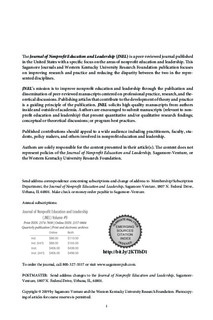| dc.contributor.author | Harding, Tobias | |
| dc.date.accessioned | 2020-03-09T10:25:52Z | |
| dc.date.available | 2020-03-09T10:25:52Z | |
| dc.date.created | 2019-01-20T12:46:40Z | |
| dc.date.issued | 2019 | |
| dc.identifier.citation | Journal of Nonprofit Education and Leadership. 2019, 9 (1), 18-38. | en_US |
| dc.identifier.issn | 1046-6819 | |
| dc.identifier.uri | https://hdl.handle.net/11250/2645970 | |
| dc.description | In the case of the Accepted Manuscript and the Published Journal Article, the Retained Rights exclude Commercial Use, other than use by the author in a subsequent compilation of the author’s works or to extend the Article to book length form or re-use by the author of portions or excerpts in other works. | en_US |
| dc.description.abstract | This article explains the role of noncredit-based leadership education in, or aimed at, civil society in Sweden, and it discusses the extent to which this role has changed over the last 100 years. Working from previous research, it explores the idea that the specific features of Swedish civil society—including the prominent role of popular movement organizations, and the system of government support for such organizations—have shaped the organization of such education in Sweden, giving a central role to the broad concept of knowledge and education as folkbildning. Examples suggest that as academic education has become more common among leaders in civil society, leadership education conducted within civil society organizations has become increasingly normative and often tailor-made to suit the needs and ideology of specific organizations. This partially explains why university- and credit-based education of civil society leaders and managers has remained comparatively limited in Sweden, while noncredit-based education developed in civil society has become comparatively prevalent. It also explains why it is based on a different approach than university-based education. As a secondary aim, this article seeks to highlight areas of further research that will increase understanding of the role of noncredit-based leadership education in, or aimed at, civil society in Sweden and to discuss the extent this role has changed over time. | en_US |
| dc.language.iso | eng | en_US |
| dc.rights | Navngivelse-Ikkekommersiell 4.0 Internasjonal | * |
| dc.rights.uri | http://creativecommons.org/licenses/by-nc/4.0/deed.no | * |
| dc.title | The Role of the Popular Movement Tradition in Shaping Civil Society Leadership Education in Sweden | en_US |
| dc.type | Peer reviewed | en_US |
| dc.type | Journal article | en_US |
| dc.description.version | publishedVersion | en_US |
| dc.rights.holder | 2019 The author(s) | en_US |
| dc.source.pagenumber | 18-38 | en_US |
| dc.source.volume | 9 | en_US |
| dc.source.journal | Journal of Nonprofit Education and Leadership | en_US |
| dc.source.issue | 1 | en_US |
| dc.identifier.doi | 10.18666/JNEL-2019-V9-I1-9596 | |
| dc.identifier.cristin | 1661147 | |
| cristin.unitcode | 222,59,3,0 | |
| cristin.unitname | Institutt for kultur, religion og samfunnsfag | |
| cristin.ispublished | true | |
| cristin.fulltext | original | |
| cristin.qualitycode | 1 | |

